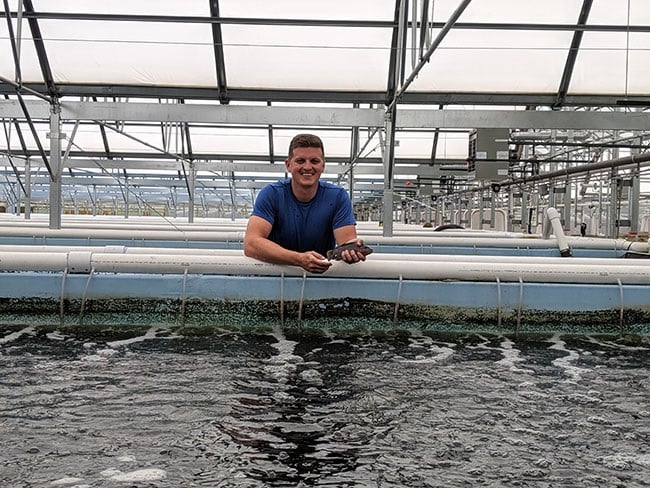 Joe Sweeney, CEO of Eagle's Catch, a tilapia farm in Ellsworth, Iowa. (Photo credit: Eagle's Catch)
Joe Sweeney, CEO of Eagle's Catch, a tilapia farm in Ellsworth, Iowa. (Photo credit: Eagle's Catch) A Nevada CUSO dedicated to enhancing businesses in rural and underserved areas has helped resurrect textile jobs in the Mississippi Delta and allowed an Iowa fish farm to swim through the cash strains of the pandemic.
Greater Nevada Credit Union of Carson City ($1.3 billion in assets, 76,338 members) launched Greater Commercial Lending in 2017 to help member credit unions offer commercial loans, including federally guaranteed loans through the USDA and Small Business Administration.
Recommended For You
GCL typically brokers the loans, allowing local credit unions to originate them. GCL bundles and sells the guaranteed loans to investors, and retains servicing rights. It also organizes participations in conventional commercial loans among interested credit unions and community banks.
The Reno-based CUSO has a network of lenders that includes 10 credit unions with $9 billion in assets and 645,201 members from Kalamazoo, Mich., to Baton Rouge, La.
The CUSO is simply doing what CUSOs were designed to do: Use concentrations of expertise to share more widely in the credit union movement.
But, like many CUSOs, GCL was confronted with conditions that were neither typical nor simple after the World Health Organization declared COVID-19 a pandemic on March 11.
 Jeremy Gilpin
Jeremy Gilpin EVP Jeremy Gilpin said the vast amount of dollars for most of the government pandemic loans were originated by big banks, but credit unions and community banks served the most vulnerable businesses.
"Where we put our dollars as credit unions and community banks – that's the story," he said. "We put them into underserved communities, rural communities where the big banks wouldn't go."
Gilpin has closed and serviced more than $900 million in loans in the past 20 years. He came to Greater Nevada in 2013 to start its commercial loan division, which is now the nation's largest USDA business lender.
Gilpin grew up in Parsons, Kansas, where its population that tops 10,000 makes it the biggest city in Labette County. His father was an engineer in a nearby munitions plant and his mother was a schoolteacher. His grandparents on both sides farmed in the southeast Kansas area.
Growing up, he learned how the loss of factories or other businesses can devastate rural areas. Gilpin is a past chair of The National Rural Lenders Association, an organization that partners with USDA national directors and political leaders to ensure rural communities maintain access to viable financing options.
Gilpin said GCL measures success not just by loan production, but by the number of jobs created or saved. "We're about protecting underserved and rural communities. That is my passion."
GCL finds a local credit union or community bank and offers it a chance to participate in the loan. "So the credit union has a premium off that loan," he said. "It helps the credit union, it helps its bottom line and it helps the community financial institution from being swallowed up as well."
GCL sells all of its federally guaranteed loans to investors from life insurance companies to hedge funds, and shares $75 million a year in premiums with rural credit unions and community banks.
For conventional commercial loans without federal guarantees, GCL organizes participations.
"It's helping small, local credit unions and community banks bolster their balance sheets so they can continue to provide the services that these rural communities desire," he said. "We help them remain in that community and continue to be a vital part of that community."
While GCL doesn't hold loans on its books, it retains servicing rights for most of its loans. Its servicing pool has risen from $282 million in its first year to $1.3 billion in September.
"We are the back office for all of these credit unions and community banks," Gilpin said. "It's all held on credit union and community bank balance sheets."
GCL regularly serves about 20 credit unions and community banks, and has a network of 120 investors that buy its guaranteed paper.
USDA commercial lending criteria are broad, and GCL has shepherded loans for sewer lines, fiber optics, hospitals, schools, fire stations, auto part manufacturers, greenhouses and restaurants. "We do everything," Gilpin noted.
One of GCL's early clients was Eagle's Catch in Ellsworth, Iowa. GCL funded a $10 million loan with a USDA guarantee to help build a farm to raise tilapia fish to be sold live to restaurants.
 Workers at Vidalia Mills in Vidalia, La. (Photo credit: Vidalia Mills)
Workers at Vidalia Mills in Vidalia, La. (Photo credit: Vidalia Mills) Another was Vidalia Denim, which announced plans in 2018 to build a cotton mill in a former 900,000-square-foot distribution facility abandoned by Fruit of the Loom in 2017 as it moved its operations to Mexico.
Vidalia Denim's plan is to use local cotton on new ring-spinning frames and weave the yarn on 46-year-old Draper X3 shuttle looms recovered from Cone Mills' White Oak plant in Greensboro, N.C., as it shut down after 112 years.
Financing for the plant a mile from the banks of the Mississippi River included a $25 million USDA-guaranteed commercial loan to purchase, renovate and equip the mill. The loan was brokered by GCL and originated by Jefferson Financial Federal Credit Union of Metairie, La. ($891.6 million in assets, 52,728 members).
In addition, Greater Nevada originated a $5 million SBA loan for other equipment and working capital.
Then came the coronavirus. After March 11, credit unions across the country started shutting down branches. While some workers were idled, others soon became incredibly busy.
GCL switched to making Paycheck Protection Program (PPP) loans for small businesses. The program was part of the CARES Act approved by Congress and signed by President Trump on March 27, but details were sketchy before the SBA started accepting applications from approved lenders on Friday, April 3.
GCL, like most lenders, planned to start accepting applications the following Monday, but Gilpin and his bosses made an on-the-spot decision to start taking applications by noon Friday after getting a call from a distressed business owner.
It was like turning on a fire hose.
GCL went from having about 25 employees at the end of March to 125 workers in two weeks by borrowing employees from other CUSOs whose workers might normally be working on, say, auto loans or commercial loans, which dried up in the early weeks of the pandemic.
"It was definitely a labor of love because we were so manual in the process. It was 20- and 22-hour days for us, seven days a week," he said. "Close to the end of the first round, I had a contractor come to my house, and we stayed up 48 hours straight inputting this."
Still, GCL had 800 applications in the pipeline on April 14, when the program's $349 billion was exhausted. "That was heartbreaking," he said.
Another $320 billion was approved for PPP loans on April 24, with the SBA to begin taking applications on April 27.
Gilpin said he spent those three days before the second round working with a software company to automate the application process, while GCL employees called all the applicants who didn't get approved in the first round to tell them their applications would be processed.
"When we opened up the second round, we were able to get an authorization every 10 minutes," he said.
From April 3 through the end of PPP lending on Aug. 8, GCL helped 5,901 businesses across the country obtain $583 million in PPP loans supporting 61,000 jobs. That included more than $137 million supporting 17,296 jobs at 2,100 companies in Nevada – 25% of all PPP loans in Nevada.
Later in April, Gilpin turned to another part of the CARES Act, which had earmarked $1 billion for a USDA loan guarantee program. He helped write a white paper for the Rural Lenders Roundtable outlining how the USDA's pandemic loan program could work to provide working capital for businesses struggling because of the pandemic.
The USDA adopted the recommendations with additions of its own by early July. The resulting USDA Business and Industry CARES Act loans were designed to help rural businesses prevent, prepare for or respond to the effects of the coronavirus pandemic. The program provides a working capital line of credit drawn on a monthly basis for 12 months, based on the company's monthly cash-flow needs.
"What we're doing is stopping the initial bleeding by providing recapitalization for stabilization," he said. "We're already seeing a lot of recovery from most of these companies."
Among the first round of recipients was Eagle's Catch, the Iowa tilapia farm that GCL helped launch in 2018.
With the first wave of shutdowns in March, its cash flow dwindled. Shipments came to a halt for about a week while the company still had to maintain enough workers to keep the facility clean and the fish healthy.
Eagle's Catch did get a PPP loan of about $100,000 to $150,000 to cover payroll. Another source of help came from a USDA deferment program. In the wake of the pandemic, the USDA offered six months of deferment of principal and interest on any current loans carrying a USDA guarantee. Eagle's Catch was able to use that against its 2018 loan to preserve more working capital.
Then the tide turned. Restaurants couldn't get fish from China because of supply chain disruptions caused by the pandemic.
"Their only option was the nation's largest tilapia farm," Gilpin said. "They went from a complete shutdown to a rocket."
But despite the help from the PPP loan and USDA deferments, strong fundamentals and great prospects, Eagle's Catch still needed cash.
Those conditions made it an ideal target for a USDA pandemic loan. GCL brokered a $2.3 million loan for Eagle's Catch to increase capacity and hire more workers.
This year, GCL has submitted more than $300 million in CARES Act loans, supporting businesses through the crisis.
"It's a side of COVID we don't hear about: This pandemic is killing businesses that otherwise would be successful," Gilpin said.
© 2025 ALM Global, LLC, All Rights Reserved. Request academic re-use from www.copyright.com. All other uses, submit a request to asset-and-logo-licensing@alm.com. For more information visit Asset & Logo Licensing.





